It was one of those hinge points in Steve Francis’s life. He would be transitioning from college to the pros, from unpaid to paid. Just as Francis’s unlikely backstory—a rough childhood, a junior college transfer, a transcendent season at Maryland—was rocketing around the basketball cosmos, so, too, was speculation he was going to be the first pick in the 1999 NBA draft, the new backcourt star of the Bulls as they rebuilt from the Michael Jordan era.
For all the players who worry about whether they’ll be drafted, the great suspense for Francis was learning where and for whom he would be working. Better still, the draft was being held at the MCI Center in Washington, D.C., a few miles from where Francis had been raised by his grandmother, in Takoma Park, Md. At the event, his agents were flanked by his Reebok representatives, who were flanked by publicists. A huge mural of him— “Godzilla-size,” as the Washingtonian characterized it—covered a wall adjacent to the arena.
But an evening that should have marked one of the great highlights in Francis’s life broke unhappily. With the No. 1 pick, the Bulls selected Elton Brand. When Francis was then chosen second, he wore the look not of a soon-to-be NBA millionaire, but of a man conscripted to serve in a foreign land.
Which, essentially, he was.
Francis was selected by the Vancouver Grizzlies, an expansion team in 1995 located in what by any measure was—and is—one of the Great Cities of the World. The franchise was about to make Francis its centerpiece and wealthy almost to the point of abstraction.
Francis, though, could not even fake joy. As the draftee slumped to the lectern, NBA commissioner David Stern sidled up and gently encouraged him to smile. Which Francis did not. He’d never before left the U.S., and he wasn’t pleased about the prospects of doing so for this job.
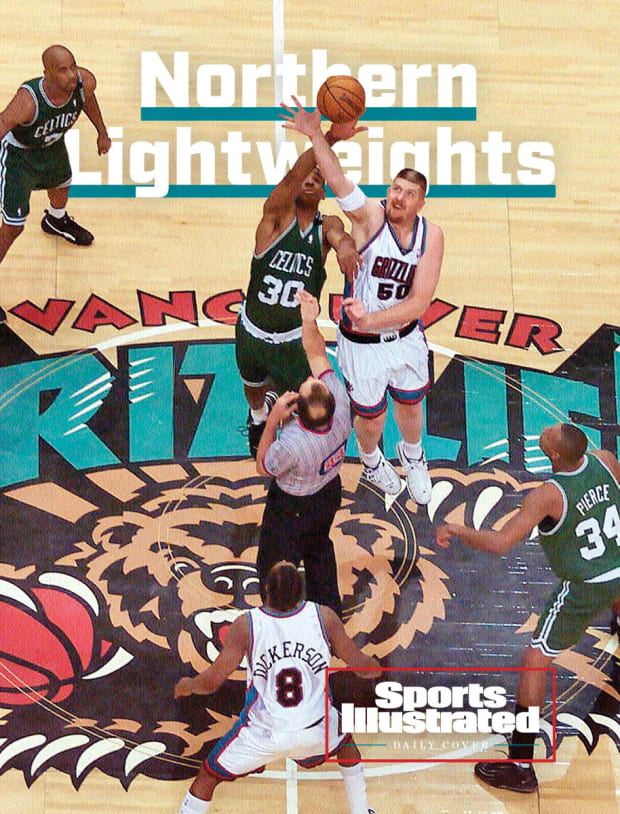
Chuck Stoody/AP
During what was supposed to be a giddy welcome interview, Francis was asked by the Grizzlies’ flagship radio station what he knew about Canada. And he minced no words. “It’s cold. It rains a lot. It takes all your money.” Francis told an interviewer: “Hopefully tomorrow when I wake up I’ll be happy.”
As it turned out, Francis didn’t even make it to the disgruntled-employee phase. He begrudgingly visited Vancouver over the summer—a trip that soured when a woman at the airport ticket counter in Canada side-eyed Francis and his coterie and asked, “Is that a rap group?” But that was it. Before the season started, the Grizzlies traded Francis to the Rockets for four veteran players. That year, the NBA’s northernmost team would once again finish in the nether regions of the standings. And within two years, the franchise would leave Western Canada for West Tennessee.
“I will never forget that day when I had to tell the employees not only that we were leaving Vancouver, but that the team was moving to the banks of a muddy river in Tennessee,” recalls former Grizzlies president Andy Dolich, who, for the record, relocated to Memphis with the team. “But there really wasn’t much choice.”
It took a while (it’s been 27 years since Stern installed the expansion team), but today’s Grizzlies are finally darlings of the NBA, cult favorites among discerning fans, led by Ja Morant, a sort of proto-Francis—another 6' 3" guard with a first step as explosive as his backstory is unlikely. The franchise has now been in Memphis almost four times as long as it was in Vancouver, but now is as good a time as any to consider the Grizzlies’ origin story and their misbegotten six seasons in their original home.
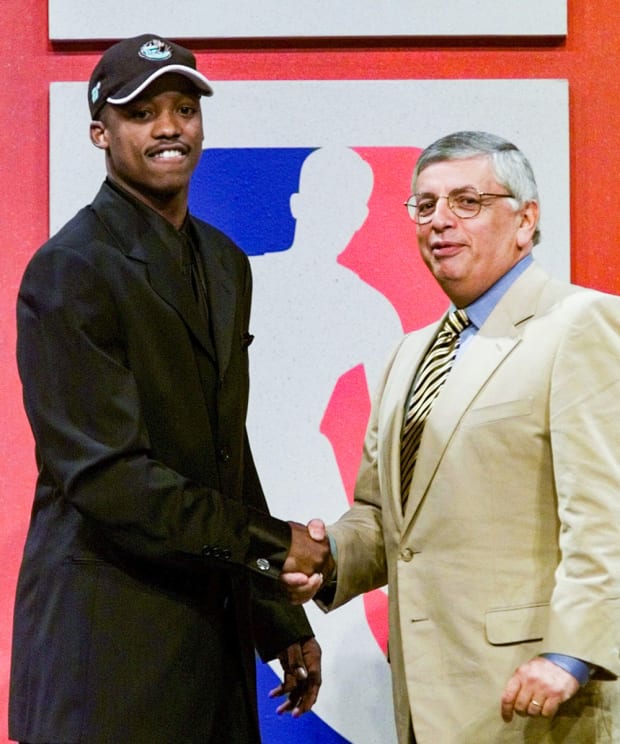
Doug Mills/AP
Vancouver represented a market that seemed to offer so much: a multicultural fan base, humming with new money; and tentacles in the tech sector, figuring squarely in the Pacific Rim. The Grizzlies would christen a new downtown arena, GM Place, which it would share with the NHL’s Canucks. Vancouver was even the first NBA team to have its own website. And yet, in the mid-1990s, the NBA could not make it work there. This was the equivalent of a team with a stacked roster that simply never coalesced.
Why did the Grizzlies fail in Vancouver? An autopsy report reveals no obvious cause of death. No single catastrophic event. No lone bad actor. This was the organizational equivalent of death by a thousand cuts. The Grizzlies’ time in Vancouver was marked by countless humiliations and hurdles, large and small, real and perceived—from a rumor among NBA players that Vancouver lacked grocery stores, to the very real challenge of a stubbornly low exchange rate and the struggle of bringing (losing) NBA basketball to an NHL stronghold.
For all the unchecked growth and towering successes the NBA has enjoyed—and earned—over the past, say, 30 years, the Vancouver Grizzlies figure prominently in the loss column. Referred to as “David’s Folly,” one of the rare missteps by Stern, the NBA’s inability to accommodate a team in a dazzling world-class city (or vice versa) remains, if not a mystery, a stinging missed opportunity.
It started with the Concorde. Or rather, the decline of the Concorde. For three decades, supersonic jet service across the Atlantic made it so that, from New York, a voyage to Europe was no more onerous than a trip to, say, Dallas. When Stern began as NBA commissioner, in 1984, he spoke openly and eagerly about using the Concorde to make the NBA truly global—of Atlanta playing against Berlin, or Cleveland playing Barcelona.
But the decline and eventual end of Concorde travel squelched Stern’s plans. Apart from, rightly, upending his ideas about progress—“when else in history has transportation progress gone backwards? How could it take longer today to fly from Paris to New York than it did in 1980?” Stern asked me shortly before his death, in 2020—it caused him to rethink his international growth plans.
Instead of planting teams in Europe, Stern and the NBA would, more modestly, explore expanding in North America. By 1993, it was clear the league would park two teams north of the border. Toronto, a city the size of Chicago that already had a World Series–winning baseball team, was a no-brainer. The other would go to Vancouver, which, for all its civic assets and its reputation, would present more of a challenge.
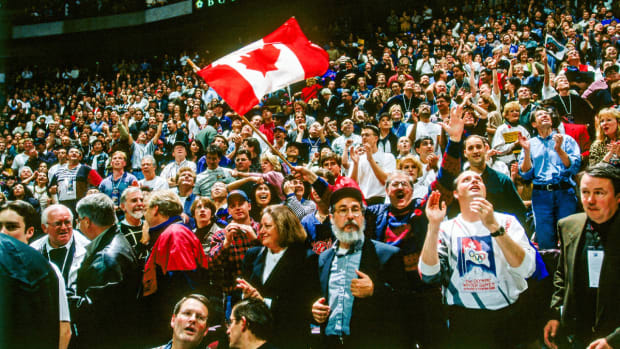
Andrew D. Bernstein/NBAE/Getty Images
Vancouver was a relatively small market with a modest commercial base. The NBA had demanded the two Canadian expansion teams each sell 12,500 season tickets by Jan. 1, 1995, but a month before the deadline Vancouver had sold just 10,000. It took a Christmas miracle to meet the threshold: On Dec. 24, a Canadian firm, Shoppers Drug Mart, purchased the needed seats.
Beyond the economics, Vancouver’s customs and immigration procedures were notoriously onerous. Foreign travelers sometimes reported spending less time on flights than waiting to have their passports stamped—not ideal for the farthest franchise from the NBA’s nerve center in New York.
And maybe above all: It offered little in the way of basketball tradition. In 1994, former Knicks coach Stu Jackson was, with Stern’s lobbying, announced as Vancouver’s general manager. Jackson once recalled that during the NBA’s All-Star weekend in ’95, he took questions on a local Vancouver sports-talk radio show: “The first call was from an elderly lady. She said, ‘Some years ago I saw the Globetrotters, and I was wondering if you plan to employ any of those tactics with our team.’ Her word: tactics.”
Lionel Hollins, who was the Grizzlies’ interim coach for the 1999–2000 season, tells a story about walking out for an exhibition game. “We got on the court. The rim is not high enough. They didn’t know how to measure it,” Hollins says. “It was a different experience for all of the people around the NBA, and it was a learning experience for the people in Canada.”
Compounding matters, the other NBA owners were something other than hospitable. As a privilege for joining the league, Vancouver’s original owner, Arthur Griffiths, had to pay a $125 million expansion fee, spare change in today’s sports economy but a steep increase from the $32.5 million the Timberwolves and Magic had paid to join the NBA in 1988.
More critically, legacy owners had bristled when Orlando had effectively jumped the line in landing Shaquille O’Neal (1992) and Penny Hardaway (’93, in a trade involving Chris Webber) through the draft. So those owners prevailed on Stern to ban the new Canadian teams from getting the No. 1 pick in any of their first three seasons.
They were also forbidden from spending more than two-thirds of their total salary cap allotment, a safeguard against a lavish free-agent signing.
Jackson, meanwhile, was a novice executive, and, apart from assessing basketball talent, he and Vancouver’s front office had to consider how potential players would adjust to living in a foreign country, often thousands of miles (and incalculable cultural miles) from home.
It was hardly predictable which players would adjust well and which wouldn’t. Bryant “Big Country” Reeves, the Grizzlies’ first draft pick (No. 6, in 1995), hailed from tiny Gans, Okla. Dolich recalls Reeves joking on the team bus, “You know the largest public works projects in Gans? My house.” Yet Reeves had no complaints about the Pacific Northwest and, despite injuries that limited his effectiveness, he was a fan favorite. Likewise, Shareef Abdur-Rahim (the No. 3 pick in ’96), who hailed from suburban Atlanta and played college ball at Cal, speaks gushingly to this day about living and working in Vancouver. Perhaps not coincidentally, he was, unquestionably, the best player in Vancouver Grizzlies history.
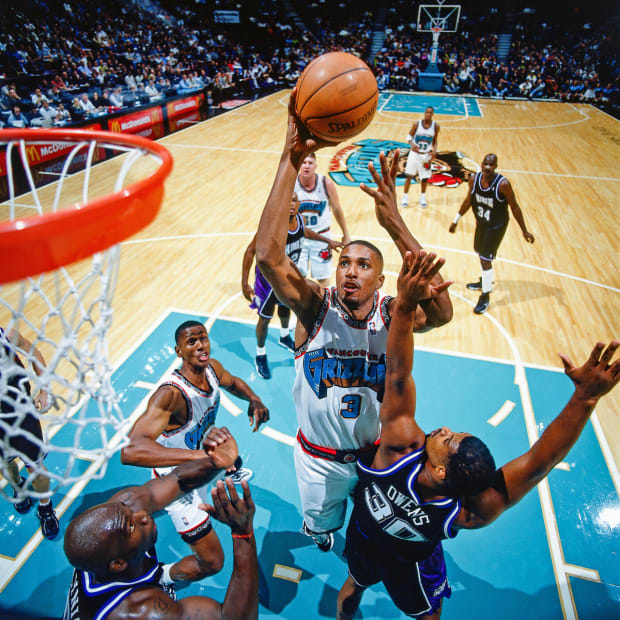
Andy Hayt/NBAE/Getty Images
Other draft picks and free agents, though, were less fond of this quirky, far-flung market. It was George Lynch, a Grizzlies forward by way of free agency for 53 games, who once remarked there were no grocery stores in Vancouver. (“Yes,” one columnist riposted, “we forage for food and occasionally get an airlift.”) Othella Harrington, one of the players traded for Francis in 1999, brought Francis-level unhappiness to Vancouver. Harrington complained so incessantly about the rainy weather that a Vancouver executive once wondered whether he was asking to be traded. Harrington corrected him: “I’m begging to be traded.” When Doug West was shipped to Vancouver—from Minnesota, no less!—he was asked how he reacted to the news. “I downed 17 Heinekens,” he said.
Benoit Benjamin, the inimitable center who played briefly for Vancouver during the 1995–96 season, was, allegedly, skeptical of Canadian banks. A former Grizzlies employee recalls that Benjamin demanded to receive his biweekly paychecks in cash—no small feat on a $3.975 million salary, as Benjamin was earning at the time. “We’d be at the Ritz-Carlton in Miami, or wherever,” says the former staffer, “and they’d say, ‘We can cash the check, but there’s a huge surcharge.’ ‘No problem.’ ”
Other financial concerns were more legitimate. More than two-thirds of the Grizzlies’ revenues went to paying the salaries of players and coaches, and the exchange rate worked to the team’s detriment. “You are taking in revenues in Canadian dollars and paying salaries in American dollars,” says Dolich. “When the Canadian dollar was trading 65 or 70 cents, yeah, that’s a challenge.”
So, too, was the tax rate. Hollins once told a Sports Illustrated reporter that the first time the Grizzlies presented players their paychecks in the locker room and they saw the various deductions and withholdings on their stubs, it did not go over well. In truth, Canada’s tax rate was scarcely higher than that of many U.S. markets (especially when accounting for universal health care), but perception mattered. Players spoke openly about the financial hit of playing in Vancouver, and their agents acted accordingly.
Whatever their tax liability, players tried to defuse it by limiting their time in Canada to fewer than 175 days per year. The upshot: The day the NBA season ended, most players returned to the U.S.—and Vancouver’s best-laid plans for summer basketball camps and offseason promotions went to hell.
Then there was the on-court product. The Grizzlies were, expectedly, awful in their first season, almost a rite of passage for expansion franchises in virtually any sport. Vancouver won the first two games it ever played . . . and then lost 19 straight, finishing its maiden season an NBA-worst 15–67.
The Grizzlies managed to finish that first year 14th out of 29 in league attendance, decent given the novelty factor. But the following season, Vancouver drew slightly smaller crowds as the team, impossibly, fared even worse, finishing at 14–68. It was around this time that SportsCenter anchors were calling the Grizzlies “The Gristle.” At the Los Angeles Times they were “the Clippers with rain.”
In the lockout-shortened 1998–99 season, Vancouver started promisingly, 3–3, only to finish 8–42. The following season, average attendance dipped to 13,899, third-lowest in the league. Like competing siblings, the Grizzlies were, reflexively, yoked to the Toronto Raptors, the other Canadian team to enter the league at the same time. Initially, they were comparably bad. In the Raptors’ first season they finished 21–61. But Toronto’s size and nightlife and relative proximity to the U.S. made it more appealing among players. And the Raptors drew fans, ranking No. 3 in average attendance at the cavernous SkyDome that maiden year.
And after three desultory campaigns, in the summer of 1998, Toronto acquired Vince Carter in a draft-night swap with the Warriors. Carter was a charismatic, heart-stoppingly entertaining player in the mold of Michael Jordan, down to their shared Carolina prove nance. Nicknamed, inevitably, “Air Canada,” Carter was precisely what the Raptors needed, and Toronto reached the postseason shortly after his arrival.
Vancouver had no such savior. Its next four lottery picks, after Abdur-Rahim: Antonio Daniels, Mike Bibby, Francis and Stromile Swift, none of whom were ever voted onto an NBA All-Star team in Vancouver. Mostly the franchise acquired veterans past their prime. A long-running effort to trade for local-boy-makes-good Steve Nash never materialized. The team was early in targeting Yao Ming, figuring he would be a star by dint of his skills and his connection to Vancouver’s considerable Asian community. But Yao didn’t enter the NBA until 2002. At which point it was too late.
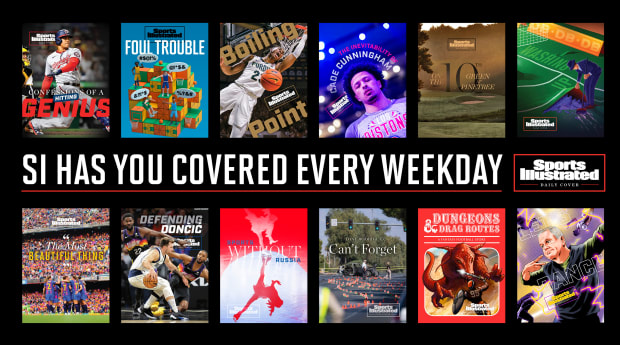
By 1999, with the team hemorrhaging money, Vancouver’s principal owner, Craig McCaw (who’d bought the team in ’96 from Griffiths), was actively looking for a buyer. He found one, for $160 million, in midwest industrialist Michael Heisley, who, fittingly, “specialized in purchasing and turning around failing companies.” At his 2000 introductory press conference, Heisley spoke rosily of Western Canada and expressed a commitment to making it work in the local market.
The commitment lasted only so long.
By multiple accounts, Heisley (who died in 2014 from complications of a stroke) took a look at the balance sheets; the considerable payroll obligations, including Reeves’s hefty $65 million contract; the modest ticket base and corporate sponsorships—and he shuddered. Days after the sale, he estimated operating losses at $50 million per season.
Within a year of the purchase, Heisley was touring other cities. They were happy to welcome an NBA franchise. And he was happy to eat the $30 million relocation fee for leaving Vancouver. Anaheim was an obvious choice, though, according to Dolich, Heisley was told by the city that to come he would also have to buy the NHL’s struggling Mighty Ducks. Las Vegas welcomed Heisley, horrifying some NBA owners, still concerned back then about the potential overlap of sports and gambling. Louisville was on the destination docket. Same for New Orleans.
Another Mississippi River city, though, quickly emerged as a favorite. The Memphis bid was going to be driven by FedEx, with its hub there, and was reported to entail renaming the team the Express and changing the colors to FedEx’s orange and blue. That particular pact never materialized, but the sale did, and so a team in Tennessee would keep the name of a bear native to British Columbia.
On March 26, 2001, Heisley announced his Grizzlies would move to Memphis over the summer. They would play at first in a college hoops venue, the Pyramid (which has since been transformed into a Bass Pro Shop), while a downtown venue, christened by FedEx, was constructed. Only a small cohort of the Grizzlies’ original employees would make the move. For years, the team’s attendance in Memphis didn’t much exceed the crowds in Canada. But it was a new home.
The final bill of particulars: In six seasons, the Vancouver Grizzlies won only 22% of their games, the lowest winning percentage for a franchise in NBA history. It goes without saying, they never made the playoffs. They never minted an All-Star. They never made significant inroads with the community.
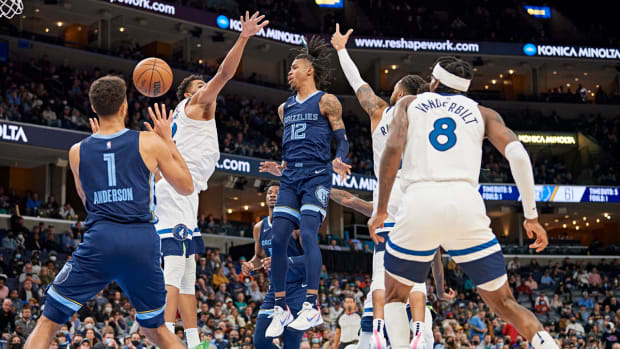
Greg Nelson/Sports Illustrated
Stern would later admit to ESPN the Grizzlies marked one of his deepest regrets. “As it turned out,” he said, “I wish we hadn’t had the Vancouver experience. Great city—and we disappointed them, and we disappointed ourselves.” (The commissioner made that concession in 2008, the same year the Seattle SuperSonics relocated to Oklahoma City, leaving the Pacific Northwest with only the Portland Trail Blazers.)
The Grizzlies’ last game at GM Place was played on April 14, 2001. It was not a sellout. More fitting still: They led the Rockets by 19 points in the second half but managed to lose, 100–95. There was no formal ceremony or public acknowledgment this would be Vancouver’s final home game. But it doubled as a wake.
Amid tears after the game, itinerant forward Tony Massenburg—the rare free agent to play in Vancouver, leave and then come back—told reporters, “I’ve been a lot of places. I’ve closed out a lot of arenas. But this one was different.” Another veteran, Grant Long, predicted basketball would be back. “Vancouver shouldn’t worry. Another NBA team will be around in a few years.”
More than 20 years later, Long’s prediction has yet to come true after the team, in the manner of a retreating grizzly bear, tiptoed out of town. But look around, and there are more than a few imprints confirming NBA basketball once existed here. You’ll see the odd, faded ABDUR-RAHIM or BIBBY or REEVES jersey, worn often with hipster irony, and other tchotchkes from some long-ago giveaway night.
More important, there are hoops all over the area. Parks once used for roller hockey now feature basketball leagues. It’s no coincidence that Western Canada has become an unlikely font of NBA talent—not least forward Brandon Clarke, who was born in Vancouver, in 1996, and now plays, ironically, for Memphis.
A few years ago, a Vancouver filmmaker, Kat Jayme, who grew up watching the Grizzlies, made an excellent documentary, Finding Big Country, about her search for Reeves, who played in every Vancouver Grizzlies season and then, when the team moved, repaired to rural Oklahoma. Very cleverly, the movie doubles as an homage to a forgotten team. Getting the film financed, Jayme says, was a challenge. “People said, ‘All Vancouver cares about is hockey.’ I was like, ‘I know this can find an audience.’ It came out and it kind of exploded.”
Galvanized by that success, she made another documentary, more directly about the Grizzlies’ time in Vancouver, treating the decline as a kind of whodunnit. Jayme initially titled the film The Worst Team Ever—but after some reporting she changed it to The Grizzlie Truth. She hopes it will be widely released in 2023.
Not unlike the jilted fans two hours south in Seattle, Jayme holds out hope the NBA will give her city another chance. She says she runs into countless people around town who share that dream. “The climate is different. The appetite is there.” What makes her so sure? “Because the pain of losing what we had is still so strong.”







